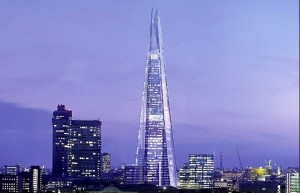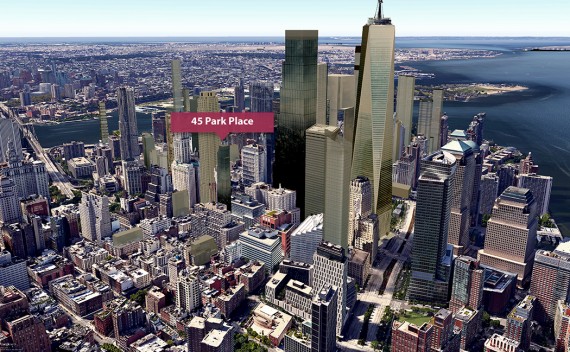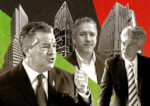Trending
By the Book: Behind El-Gamal’s deal for sharia-compliant financing at 45 Park Place
Soho Properties chief believes other developers will follow suit in tight lending market

Sharif El-Gamal is feeling pretty damn good.
The founder and CEO of Soho Properties is fresh off a $219 million financing round that allows him to build 45 Park Place, a luxury condominium in Tribeca. It’s a scenario few saw coming: A sponsor new to the condo development game, in direct competition with blue-chip projects, at a site referred to in some circles as the “Ground Zero mosque.”
And yet El-Gamal finds himself flush at a time when many of his seasoned compatriots are struggling to convince banks that the high-end market is just fine, that concerns of oversupply are overblown, and that their projects are worth betting on.
To make it happen, he brought together banks from the Middle East, Asia and Europe in a murabaha, a type of financing structure that adheres to Islamic legal principles, or sharia. Industry experts are calling it the largest construction financing of its kind ever in New York. El-Gamal believes it will set his firm apart.
“We were able to tap into a pool of water that nobody’s in,” he told The Real Deal during an interview at his agarwood-scented office on Friday. “We saw an appetite to do something without paying extra for it.”
Mine till it’s yours
Murabaha, in a nutshell, works like this: The lender buys the asset, and agrees to sell it to the borrower for a pre-agreed markup (generally determined based on a benchmark such as LIBOR plus a margin). The borrower generally pays the higher price in installments, thus giving him or her immediate funds and allowing the lender to make a profit. Interest, which violates Islamic jurisprudence, is left out of the equation. And importantly, debt cannot be sold, which deters the trading of notes that is sport among New York real estate investors.
El-Gamal took issue with news reports that described the structure as “complex.”
“It’s quite simple,” he said. “And it’s the safest form of financing, because it involves a true partnership between the lender and the borrower. It’s not a ‘loan-to-own’ vehicle — it’s not a way to trap you.” He declined to specify how much the money was costing him but said he will be paying “conventional banking rates.”
A lawyer well-versed in sharia-compliant financing said it technically isn’t safer than traditional financing – except in spirit. It is rooted, he said, in the Islamic ideal of treating one’s counterpart justly: If a borrower runs into economic distress, the lender is open to working it out, rather than “jumping down your throat.”

The Shard Building in London
The model is commonplace in Europe. London’s famous Shard Building was bankrolled in part by sharia-compliant financing from Qatar, and George Osborne, the U.K’s Chancellor of the Exchequer, has argued that London ought to become a hub of sharia-compliant finance to boost overseas investment. In New York, sources noted Macklowe’s $585 million acquisition of One Wall Street was completed in part with a sharia-compliant loan from Qatar National Bank. But its use for construction financing here, at least on this scale, is unprecedented.
When in Riyadh
Syndicating the loan took El-Gamal almost nine months.
“It was worth every day,” he said, describing a whirlwind of meetings in Riyadh, Kuwait, Dubai, London and Kuala Lumpur, and gushing about the power of New York to attract so much foreign money.
He hosted the lenders in New York And Showed Them The Park Place corridor, which he always refers to as “the new Downtown.”
“It was all about being able to showcase the city,” he said. “At the end of the day you’ve got to come down, kick the bricks, smell the air, and see what’s going on. This was going out to captive lenders and investors who want to deploy money here.”

A visualization of the “new Downtown” skyline with 45 Park Place (Credit: CityRealty)
The $174 million senior loan came from Malaysia-based Maybank and Kuwait-based Warba Bank — both debuting in New York’s condo market — as well as Italian bank Intesa Sanpaolo. MASIC, a Saudi investment firm controlled by the Al Subeaei family, made a $45 million mezzanine loan. “We have been keen on developing the investment arena and introducing new investment ideas that comply with our tradition and principles,” MASIC’s CEO Ihsan Bafakih said in a statement.
Sources familiar with the transaction said MSD Partners, an investment advisory firm led by the principals of Michael Dell’s family office MSD Capital, also holds a slice of the senior loan. El-Gamal declined to comment on MSD’s involvement.
“I’ve never seen a domestic citizen source capital with so many different foreign lenders for a construction loan,” said Aaron Appel, a broker in the real estate investment banking practice at JLL. “Most people couldn’t believe the project received financing. But I tip my hat to him. He pulled it off.”
El-Gamal, who is of Egyptian origin and fluent in Arabic, said his firm “was able to leverage our identity and our culture to build this bridge.”
“In New York, I wear my Armani suit,” he said. “But in the Middle East, I have my custom thobes.”
A “shock wave”
Several debt brokers TRD spoke to for this article said U.S. lenders were just not interested in financing the 665-foot-tall 45 Park.
“No [domestic lender] would touch that,” one broker said of the project.
But El-Gamal insists domestic banks were game. He went abroad to get a better deal, he said, and “to leverage the goodwill and the opportunity of doing something a little bit more creative.”
“My end result is to sell apartments, right?” he said. “So I should ensure that in today’s competitive market, I spread it [buzz] around the world.” Through Intesa, Warba and Maybank, 45 Park is being spoken of in Europe, Middle East and Asia respectively, he said. The 50-unit project is aiming for a nearly $400 million sellout and is set to launch sales. About two-thirds of the apartments are priced at around $2,400 per square foot, he said, making it affordable for foreign buyers.
Since the financing closed last Wednesday, El-Gamal said he’s been flooded with inquiries from other New York developers looking for the secret sauce.
“We sent a shock wave through our community,” he said. “It’s been overwhelming support and curiosity — ‘How’d you put this together? Can you introduce me to so-and-so?’ When people really start understanding this structure, they’re going to want it. I don’t care if you’re Muslim, or Jewish, or Christian or atheist. They are going to jump all over the bandwagon.”




